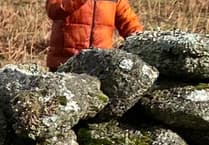A HOMELESS mental hospital patient has denied murdering his grandmother and told a jury that another can carried out the brutal knife attack.
Cameron Dancey-Stevenson told a jury that the killer demanded money from 62-year-old Alison Stevenson and killed her when she refused to pay up.
He said he listened to the attack from a neighbouring room at her home in Helston but did not witness it. He said he was too scared to intervene.
Dancey-Stevenson, aged 26, was living rough in a public park in Helston at the time of the killing on May 25, 2021 but is now a patient at the Langdon Hospital in Dawlish. He denies murder.
The prosecution say he had a grudge against his grandmother because she had banned him from her home in Greenbank, Helston, and had him arrested the previous month for breaking a restraining order.
He was due in court in Truro for sentencing for breaking the order later on the day of the killing.
The jury have been told that he killed her by stabbing her repeatedly in the neck as she lay in her bed in an upstairs bedroom. She died shortly afterwards from loss of blood.
The prosecution say there is strong forensic evidence to show that he carried out the killing and then used Mrs Stevenson’s washer and tumble drier to clean his bloodstained clothes between 2.30 and 5.30 am.
Dancey-Stevenson gave evidence that threats that he made against his grandmother to his father in a phone call a few days earlier had been a ‘joke’.
He denied being violent towards his grandmother in the past and said references by her in previous texts to threats and bad language were not a true reflection of their relationship. He said any comments he made to her were ‘just sarcasm’.
He said he had been wandering around Helston on the day before the killing and had been sitting in a church yard near her home late that night when he heard her having an argument with a stranger in her house.
He said she sounded distressed and heard the other man mention his name. He said the man’s voice produced a ‘violent garble’ from which he only recognised a reference to himself.
He said he went into the house because he thought they were planning to blame him for something and he heard his grandmother scream. He entered through a back window and went to intervene, picking up a kitchen knife.
He said: 'I did not kill Alison Stevenson. I was there when she was killed. I saw what happened to her. I know what the man looked like but I did not know them.
'I was asked to ask Alison for money and when nothing could be produced, the man killed her.'
'I was not in the room when that happened I heard something but my ears were quite pressured because of the stress. I was quite scared myself.
'I was in a different room when she was killed.'
He said the mystery man was white, about six foot tall with brown or black hair and was wearing jeans and a jacket. He challenged him and the stranger reacted by taking the knife off him in a struggle.
He said the man, who was also carrying his own knife, then asked for money.
Dancey-Stevenson said: 'He pointed the knife at me and asked me to ask for money from Alison or else.
'I did not feel very nice. I asked Alison for the codes for her cards and bank account and she said no.
'She was on the bed. The man was skulking in the middle room, Alison had a phone and said she was on the phone to the police and the man went mad.
'He was quite angry to begin with.
'I was leaving her room and made it to the middle room. This person was livid. I could tell by his posture and everything. I thought I would be safer in the middle room.
'I didn’t run away because I was too scared.
'I thought I would fall down the stairs. It is not nice to be chased by somebody with a knife. I closed the door and I heard those injuries being caused. I did not see the man again.'
He said he found his grandmother’s body and initially covered her body with his coat, which he later washed because he was worried about being blamed.
He denied lying to police about not having been to the house and said he had given a true account but they had refused to record that interview.
The trial continues




